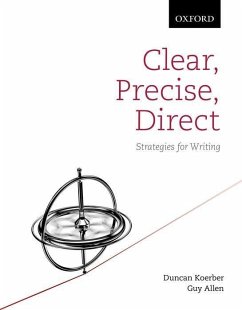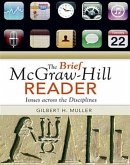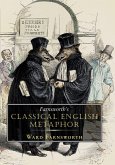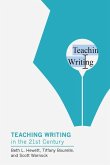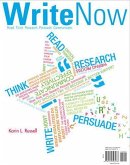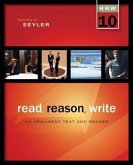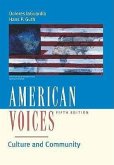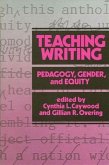- Broschiertes Buch
- Merkliste
- Auf die Merkliste
- Bewerten Bewerten
- Teilen
- Produkt teilen
- Produkterinnerung
- Produkterinnerung
Clear, Precise, Direct provides a concise set of strategies to help students improve their writing skills through exercises and assignments, including personal narrative and academic writing, with a focus on revision as well as analysis of peer writing models.
Andere Kunden interessierten sich auch für
![The Brief McGraw-Hill Reader The Brief McGraw-Hill Reader]() Gilbert H. MullerThe Brief McGraw-Hill Reader168,99 €
Gilbert H. MullerThe Brief McGraw-Hill Reader168,99 €![Farnsworth's Classical English Metaphor Farnsworth's Classical English Metaphor]() Ward FarnsworthFarnsworth's Classical English Metaphor26,99 €
Ward FarnsworthFarnsworth's Classical English Metaphor26,99 €![Teaching Writing in the Twenty-First Century Teaching Writing in the Twenty-First Century]() Beth L HewettTeaching Writing in the Twenty-First Century141,99 €
Beth L HewettTeaching Writing in the Twenty-First Century141,99 €![Write Now Write Now]() Karin L RussellWrite Now158,99 €
Karin L RussellWrite Now158,99 €![Read Reason Write Read Reason Write]() Dorothy U SeylerRead Reason Write159,99 €
Dorothy U SeylerRead Reason Write159,99 €![American Voices American Voices]() Dolores LaguardiaAmerican Voices76,99 €
Dolores LaguardiaAmerican Voices76,99 €![Teaching Writing Teaching Writing]() Teaching Writing113,99 €
Teaching Writing113,99 €-
-
-
Clear, Precise, Direct provides a concise set of strategies to help students improve their writing skills through exercises and assignments, including personal narrative and academic writing, with a focus on revision as well as analysis of peer writing models.
Hinweis: Dieser Artikel kann nur an eine deutsche Lieferadresse ausgeliefert werden.
Hinweis: Dieser Artikel kann nur an eine deutsche Lieferadresse ausgeliefert werden.
Produktdetails
- Produktdetails
- Verlag: Oxford University Press
- Seitenzahl: 304
- Erscheinungstermin: 5. Februar 2015
- Englisch
- Abmessung: 226mm x 175mm x 18mm
- Gewicht: 454g
- ISBN-13: 9780199006403
- ISBN-10: 0199006407
- Artikelnr.: 47870027
- Herstellerkennzeichnung
- Libri GmbH
- Europaallee 1
- 36244 Bad Hersfeld
- gpsr@libri.de
- Verlag: Oxford University Press
- Seitenzahl: 304
- Erscheinungstermin: 5. Februar 2015
- Englisch
- Abmessung: 226mm x 175mm x 18mm
- Gewicht: 454g
- ISBN-13: 9780199006403
- ISBN-10: 0199006407
- Artikelnr.: 47870027
- Herstellerkennzeichnung
- Libri GmbH
- Europaallee 1
- 36244 Bad Hersfeld
- gpsr@libri.de
Duncan Koerber teaches in the Professional Writing Program at York University. He is the founder of Mediahistory.ca, a bibliographic database for the growing academic field of media history in Canada. Guy Allen is the program coordinator for the Professional Writing and Communication Program at the University of Toronto. He has won three university-wide teaching awards and the 3M National Teaching Fellowship. He also co-founded Life Rattle Press, a non-profit publisher of narrative literature
* From the Publisher
* Preface
* Acknowledgements
* 1. Write Now: Start, Develop, Revise
* Where to Start
* Examples of Freewriting
* Two Composition Approaches
* Beginning with Storytelling
* - "The Stovepipe Hole" by Elizabeth Clark
* - "Cell Phone" by Peter Palladini
* Academic Writing
* Revision
* Types of Editing
* How and Where to Edit
* Chapter Summary
* Further Readings
* 2. Economy
* The Morality of Wordiness
* Forms of Wordiness
* Editing Wordiness in Academic Writing
* Peer Models for Emulation
* - "My Mom and Bramalea" by Julie Michelangelo
* - "The Pet Owner's Burden" by Emilia Di Luca
* Chapter Summary
* Further Readings
* 3. Strong Verbs
* Concrete Verbs
* Less-than-Concrete Verbs
* Abstract Verbs
* The Greater Consequences of Dead Verbs
* Academic Writing and Strong Verbs
* Final Thoughts
* Peer Models for Emulation
* - "Going to Chinese School" by Jennifer Lee
* - "Stealing Spirituality: The Non-Native Use of Native American
Spirit Guides" by Graeme Scallion
* Chapter Summary
* Further Readings
* 4. Active Voice
* Word Order
* Active Voice
* Passive Voice
* The Morality of Passive Voice
* The Permanence of Passive in Various Fields
* Is it Ever Okay to Use Passive?
* Academic Writing and Active Voice
* Final Thoughts on Active and Passive
* Peer Models for Emulation
* - "Jafar Uncle's Chocolates" by Nabila Rizvi
* - "A Flourishing of Humans" by Sara Menuck
* Chapter Summary
* Further Readings
* 5. Strong Nouns
* The Problem of Pronouns
* Examples of Unclear Pronouns
* Pronouns and Repetition
* The Morality of Unclear Pronouns
* Inclusive Pronouns
* Subject-Verb Agreement
* Adjective-Pronoun Agreement
* Academic Writing, Strong Nouns, and Vague Pronouns
* Final Thoughts on Nouns and Pronouns
* Peer Models for Emulation
* - "Two Weeks at Notre Dame Hospital" by Eric Ramadi
* - "Tobacco Cigarettes as a Cause of Urinary Bladder Cancer" by
Elizabeth Dancey
* Chapter Summary
* Further Readings
* 6. Original Language
* Examples of Clichés
* Why Would Any Writer Use Clichés?
* Is it Ever Okay to Use a Cliché?
* Original Phrasing
* Fresh Figurative Language
* Academic Writing and Original Language
* Final Thoughts on Figurative Language and Originality
* Peer Models for Examination
* - "Christine" by Adam Giles
* - "Financial Hardship among Former Professional Athletes and Its
Contributing Factors" by Taylor Lush
* Chapter Summary
* Further Readings
* 7. Parallelism
* The Grammar Behind Parallelism
* Surface and Under-the-Surface Parallelism
* Single-Element Parallelism: Part I
* Single-Element Parallelism: Part II
* Multiple-Element Parallelism
* Academic Writing and Parallelism
* Interview-based Articles
* Doing the Interview
* The Questioner and the Listener
* Writing Interviews
* Peer Models for Emulation
* - "Two Hard Years" by Joyce Ong
* - "Solace in Obsolescence: Vinyl in the Age of Free Music" by Nicole
Brewer
* Chapter Summary
* Further Readings
* 8. Sentence Variation and Sound
* Sentence Patterns
* Short Sentences
* Long Sentences
* Variation of Long and Short for Effect
* Academic Writing and Sentence Variation
* Sound
* Personal Essays
* The Power of the Personal Essay
* Writer as Cultural Observer
* Writer as Activist
* Personal Essays and the Truth
* Three Rhetorical Elements
* Peer Model Writing for Emulation
* - "I Wear My Too-black Skin with Pride" by Petura Burrows
* - "Saints and Monsters: The Psychology of Altruism and Malice" by
Nick Zabara
* Chapter Summary
* Further Readings
* Appendix: Research and Citations
* Glossary
* Credits
* Works Cited
* Index
* Preface
* Acknowledgements
* 1. Write Now: Start, Develop, Revise
* Where to Start
* Examples of Freewriting
* Two Composition Approaches
* Beginning with Storytelling
* - "The Stovepipe Hole" by Elizabeth Clark
* - "Cell Phone" by Peter Palladini
* Academic Writing
* Revision
* Types of Editing
* How and Where to Edit
* Chapter Summary
* Further Readings
* 2. Economy
* The Morality of Wordiness
* Forms of Wordiness
* Editing Wordiness in Academic Writing
* Peer Models for Emulation
* - "My Mom and Bramalea" by Julie Michelangelo
* - "The Pet Owner's Burden" by Emilia Di Luca
* Chapter Summary
* Further Readings
* 3. Strong Verbs
* Concrete Verbs
* Less-than-Concrete Verbs
* Abstract Verbs
* The Greater Consequences of Dead Verbs
* Academic Writing and Strong Verbs
* Final Thoughts
* Peer Models for Emulation
* - "Going to Chinese School" by Jennifer Lee
* - "Stealing Spirituality: The Non-Native Use of Native American
Spirit Guides" by Graeme Scallion
* Chapter Summary
* Further Readings
* 4. Active Voice
* Word Order
* Active Voice
* Passive Voice
* The Morality of Passive Voice
* The Permanence of Passive in Various Fields
* Is it Ever Okay to Use Passive?
* Academic Writing and Active Voice
* Final Thoughts on Active and Passive
* Peer Models for Emulation
* - "Jafar Uncle's Chocolates" by Nabila Rizvi
* - "A Flourishing of Humans" by Sara Menuck
* Chapter Summary
* Further Readings
* 5. Strong Nouns
* The Problem of Pronouns
* Examples of Unclear Pronouns
* Pronouns and Repetition
* The Morality of Unclear Pronouns
* Inclusive Pronouns
* Subject-Verb Agreement
* Adjective-Pronoun Agreement
* Academic Writing, Strong Nouns, and Vague Pronouns
* Final Thoughts on Nouns and Pronouns
* Peer Models for Emulation
* - "Two Weeks at Notre Dame Hospital" by Eric Ramadi
* - "Tobacco Cigarettes as a Cause of Urinary Bladder Cancer" by
Elizabeth Dancey
* Chapter Summary
* Further Readings
* 6. Original Language
* Examples of Clichés
* Why Would Any Writer Use Clichés?
* Is it Ever Okay to Use a Cliché?
* Original Phrasing
* Fresh Figurative Language
* Academic Writing and Original Language
* Final Thoughts on Figurative Language and Originality
* Peer Models for Examination
* - "Christine" by Adam Giles
* - "Financial Hardship among Former Professional Athletes and Its
Contributing Factors" by Taylor Lush
* Chapter Summary
* Further Readings
* 7. Parallelism
* The Grammar Behind Parallelism
* Surface and Under-the-Surface Parallelism
* Single-Element Parallelism: Part I
* Single-Element Parallelism: Part II
* Multiple-Element Parallelism
* Academic Writing and Parallelism
* Interview-based Articles
* Doing the Interview
* The Questioner and the Listener
* Writing Interviews
* Peer Models for Emulation
* - "Two Hard Years" by Joyce Ong
* - "Solace in Obsolescence: Vinyl in the Age of Free Music" by Nicole
Brewer
* Chapter Summary
* Further Readings
* 8. Sentence Variation and Sound
* Sentence Patterns
* Short Sentences
* Long Sentences
* Variation of Long and Short for Effect
* Academic Writing and Sentence Variation
* Sound
* Personal Essays
* The Power of the Personal Essay
* Writer as Cultural Observer
* Writer as Activist
* Personal Essays and the Truth
* Three Rhetorical Elements
* Peer Model Writing for Emulation
* - "I Wear My Too-black Skin with Pride" by Petura Burrows
* - "Saints and Monsters: The Psychology of Altruism and Malice" by
Nick Zabara
* Chapter Summary
* Further Readings
* Appendix: Research and Citations
* Glossary
* Credits
* Works Cited
* Index
* From the Publisher
* Preface
* Acknowledgements
* 1. Write Now: Start, Develop, Revise
* Where to Start
* Examples of Freewriting
* Two Composition Approaches
* Beginning with Storytelling
* - "The Stovepipe Hole" by Elizabeth Clark
* - "Cell Phone" by Peter Palladini
* Academic Writing
* Revision
* Types of Editing
* How and Where to Edit
* Chapter Summary
* Further Readings
* 2. Economy
* The Morality of Wordiness
* Forms of Wordiness
* Editing Wordiness in Academic Writing
* Peer Models for Emulation
* - "My Mom and Bramalea" by Julie Michelangelo
* - "The Pet Owner's Burden" by Emilia Di Luca
* Chapter Summary
* Further Readings
* 3. Strong Verbs
* Concrete Verbs
* Less-than-Concrete Verbs
* Abstract Verbs
* The Greater Consequences of Dead Verbs
* Academic Writing and Strong Verbs
* Final Thoughts
* Peer Models for Emulation
* - "Going to Chinese School" by Jennifer Lee
* - "Stealing Spirituality: The Non-Native Use of Native American
Spirit Guides" by Graeme Scallion
* Chapter Summary
* Further Readings
* 4. Active Voice
* Word Order
* Active Voice
* Passive Voice
* The Morality of Passive Voice
* The Permanence of Passive in Various Fields
* Is it Ever Okay to Use Passive?
* Academic Writing and Active Voice
* Final Thoughts on Active and Passive
* Peer Models for Emulation
* - "Jafar Uncle's Chocolates" by Nabila Rizvi
* - "A Flourishing of Humans" by Sara Menuck
* Chapter Summary
* Further Readings
* 5. Strong Nouns
* The Problem of Pronouns
* Examples of Unclear Pronouns
* Pronouns and Repetition
* The Morality of Unclear Pronouns
* Inclusive Pronouns
* Subject-Verb Agreement
* Adjective-Pronoun Agreement
* Academic Writing, Strong Nouns, and Vague Pronouns
* Final Thoughts on Nouns and Pronouns
* Peer Models for Emulation
* - "Two Weeks at Notre Dame Hospital" by Eric Ramadi
* - "Tobacco Cigarettes as a Cause of Urinary Bladder Cancer" by
Elizabeth Dancey
* Chapter Summary
* Further Readings
* 6. Original Language
* Examples of Clichés
* Why Would Any Writer Use Clichés?
* Is it Ever Okay to Use a Cliché?
* Original Phrasing
* Fresh Figurative Language
* Academic Writing and Original Language
* Final Thoughts on Figurative Language and Originality
* Peer Models for Examination
* - "Christine" by Adam Giles
* - "Financial Hardship among Former Professional Athletes and Its
Contributing Factors" by Taylor Lush
* Chapter Summary
* Further Readings
* 7. Parallelism
* The Grammar Behind Parallelism
* Surface and Under-the-Surface Parallelism
* Single-Element Parallelism: Part I
* Single-Element Parallelism: Part II
* Multiple-Element Parallelism
* Academic Writing and Parallelism
* Interview-based Articles
* Doing the Interview
* The Questioner and the Listener
* Writing Interviews
* Peer Models for Emulation
* - "Two Hard Years" by Joyce Ong
* - "Solace in Obsolescence: Vinyl in the Age of Free Music" by Nicole
Brewer
* Chapter Summary
* Further Readings
* 8. Sentence Variation and Sound
* Sentence Patterns
* Short Sentences
* Long Sentences
* Variation of Long and Short for Effect
* Academic Writing and Sentence Variation
* Sound
* Personal Essays
* The Power of the Personal Essay
* Writer as Cultural Observer
* Writer as Activist
* Personal Essays and the Truth
* Three Rhetorical Elements
* Peer Model Writing for Emulation
* - "I Wear My Too-black Skin with Pride" by Petura Burrows
* - "Saints and Monsters: The Psychology of Altruism and Malice" by
Nick Zabara
* Chapter Summary
* Further Readings
* Appendix: Research and Citations
* Glossary
* Credits
* Works Cited
* Index
* Preface
* Acknowledgements
* 1. Write Now: Start, Develop, Revise
* Where to Start
* Examples of Freewriting
* Two Composition Approaches
* Beginning with Storytelling
* - "The Stovepipe Hole" by Elizabeth Clark
* - "Cell Phone" by Peter Palladini
* Academic Writing
* Revision
* Types of Editing
* How and Where to Edit
* Chapter Summary
* Further Readings
* 2. Economy
* The Morality of Wordiness
* Forms of Wordiness
* Editing Wordiness in Academic Writing
* Peer Models for Emulation
* - "My Mom and Bramalea" by Julie Michelangelo
* - "The Pet Owner's Burden" by Emilia Di Luca
* Chapter Summary
* Further Readings
* 3. Strong Verbs
* Concrete Verbs
* Less-than-Concrete Verbs
* Abstract Verbs
* The Greater Consequences of Dead Verbs
* Academic Writing and Strong Verbs
* Final Thoughts
* Peer Models for Emulation
* - "Going to Chinese School" by Jennifer Lee
* - "Stealing Spirituality: The Non-Native Use of Native American
Spirit Guides" by Graeme Scallion
* Chapter Summary
* Further Readings
* 4. Active Voice
* Word Order
* Active Voice
* Passive Voice
* The Morality of Passive Voice
* The Permanence of Passive in Various Fields
* Is it Ever Okay to Use Passive?
* Academic Writing and Active Voice
* Final Thoughts on Active and Passive
* Peer Models for Emulation
* - "Jafar Uncle's Chocolates" by Nabila Rizvi
* - "A Flourishing of Humans" by Sara Menuck
* Chapter Summary
* Further Readings
* 5. Strong Nouns
* The Problem of Pronouns
* Examples of Unclear Pronouns
* Pronouns and Repetition
* The Morality of Unclear Pronouns
* Inclusive Pronouns
* Subject-Verb Agreement
* Adjective-Pronoun Agreement
* Academic Writing, Strong Nouns, and Vague Pronouns
* Final Thoughts on Nouns and Pronouns
* Peer Models for Emulation
* - "Two Weeks at Notre Dame Hospital" by Eric Ramadi
* - "Tobacco Cigarettes as a Cause of Urinary Bladder Cancer" by
Elizabeth Dancey
* Chapter Summary
* Further Readings
* 6. Original Language
* Examples of Clichés
* Why Would Any Writer Use Clichés?
* Is it Ever Okay to Use a Cliché?
* Original Phrasing
* Fresh Figurative Language
* Academic Writing and Original Language
* Final Thoughts on Figurative Language and Originality
* Peer Models for Examination
* - "Christine" by Adam Giles
* - "Financial Hardship among Former Professional Athletes and Its
Contributing Factors" by Taylor Lush
* Chapter Summary
* Further Readings
* 7. Parallelism
* The Grammar Behind Parallelism
* Surface and Under-the-Surface Parallelism
* Single-Element Parallelism: Part I
* Single-Element Parallelism: Part II
* Multiple-Element Parallelism
* Academic Writing and Parallelism
* Interview-based Articles
* Doing the Interview
* The Questioner and the Listener
* Writing Interviews
* Peer Models for Emulation
* - "Two Hard Years" by Joyce Ong
* - "Solace in Obsolescence: Vinyl in the Age of Free Music" by Nicole
Brewer
* Chapter Summary
* Further Readings
* 8. Sentence Variation and Sound
* Sentence Patterns
* Short Sentences
* Long Sentences
* Variation of Long and Short for Effect
* Academic Writing and Sentence Variation
* Sound
* Personal Essays
* The Power of the Personal Essay
* Writer as Cultural Observer
* Writer as Activist
* Personal Essays and the Truth
* Three Rhetorical Elements
* Peer Model Writing for Emulation
* - "I Wear My Too-black Skin with Pride" by Petura Burrows
* - "Saints and Monsters: The Psychology of Altruism and Malice" by
Nick Zabara
* Chapter Summary
* Further Readings
* Appendix: Research and Citations
* Glossary
* Credits
* Works Cited
* Index

